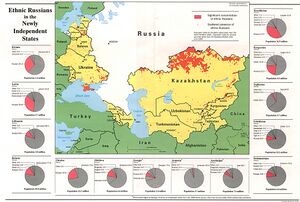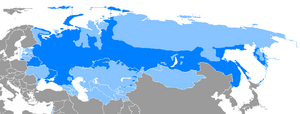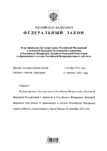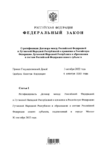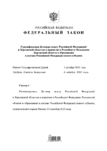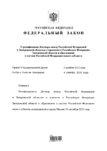الوحدوية الروسية
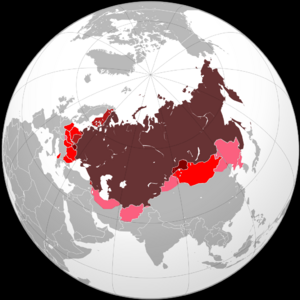
The Soviet Union in 1945
Soviet territories that were never part of the Russian Empire: Tuva, East Prussia, Western Ukraine and southern Kurils
Russian Empire territories that did not become part of the Soviet Union: Finland, Congress Poland and Kars Oblast
The Soviet near abroad: Warsaw Pact and Mongolia
Russian Empire's sphere of influence and Soviet military occupation (Northern Iran, Xinjiang, Manchuria, North Korea and Afghanistan)
Russian irredentism refers to irredentist claims to parts of the former Russian Empire and the former Soviet Union made for Russia. It seeks to incorporate Russians outside of Russian borders into the current Russian state.
The 2014 annexation of Crimea[1] and the 2022 annexation of Southern and Eastern Ukraine are described as an example of irredentist policy.
Russian irredentists seek to annex parts of the "near abroad", such as the Baltic states, with the 2022 Russian invasion of Ukraine described as a continuation of irredentist claims.
خلفية أيديولوجية
Specifically looking at the viewpoints of post-Soviet Russian leader Vladimir Putin, Erdi Ozturk, a professor at London Metropolitan University, has commented that irredentist ideology relies upon a "distinction between civilisations by synthesising nationalism with nostalgic visions of history, memory, and religion."[2]
الأقاليم
According to Luke Harding of The Guardian , the main territories that supporters of Russian irredentism talk about the need to join are the south and east of Ukraine , Transnistria (a territory not controlled by the Republic of Moldova), the Baltic countries [23] and Central Asia (mainly Northern Kazakhstan ). The main obstacles to this are various political and economic factors, ranging from different economic indicators to political structure ( Estonia , Latvia and Lithuania are members of the European Union andNATO ) and the risks of conflicts (for example, the importance of the sovereignty of Kazakhstan was announced in 2014 by President Nursultan Nazarbayev ).
In many areas of Slavic neo-paganism (rodnovery), Slavs or Russians are credited with historical and cultural or racial superiority over other peoples. This ideology includes Russian messianism , the Russian people are considered the only force capable of resisting world evil and leading the rest of the world. The " Aryan " idea sets before Russia the task of building an analogue of the " Fourth Reich ", a new "Aryan" empire on a global scale. The Russian Aryan myth rejects any territorial disputes, since the Russian people are portrayed as absolutely autochthonous throughout Eurasia. The model of an ethno-national state associated with the separatism of individual Russian regions is less common. Next to the neo-pagans, Russia is supposed to be fragmented into several Russian national states, devoid of ethnic minorities
التاريخ
الامبراطورية الروسية
From roughly the 16th century to the 20th century, the Russian Empire followed an expansionist policy.[n 1] Few of these actions had irredentist justifications, though the conquest of parts of the Ottoman Empire in the Caucasus in 1877 to bring Armenian Christians under the protection of the Tsar may represent one example.[3]
ما بعد الاتحاد السوڤيتي
After the dissolution of the Soviet Union in 1991, it was thought that the Russian Federation had given up on plans of territorial expansion or kin-state nationalism, despite some 25 million ethnic Russians living in neighboring countries outside Russia.[4] Stephen M. Saideman and R. William Ayres assert that Russia followed a non-irredentist policy in the 1990s despite some justifications for irredentist policies—one factor disfavoring irredentism was a focus by the ruling interest in consolidating power and the economy within the territory of Russia.[5] Furthermore, a stable policy of irredentism popular with the electorate was not found, and politicians proposing such ideas did not fare well electorally.[6] Russian nationalist politicians tended to focus on internal threats (i.e. "outsiders") rather than on the interests of Russians outside the federation.[7]
ضم القرم 2014
It has been proposed that the annexation of Crimea in 2014 proves Russia's adherence to irredentism today.[8][9][10][11] After the event in Crimea, the Transnistrian authorities requested Russia to annex Transnistria.[12][13][14]
The annexation of Crimea led to a new wave of Russian nationalism, with large parts of the Russian far right movement aspiring to annex even more land from Ukraine, including the unrecognized Novorossiya.[15] Analyst Vladimir Socor proposed that Russian president Vladimir Putin's speech after the annexation of Crimea was a de facto "manifesto of Greater-Russia Irredentism".[16] After international sanctions were imposed against Russia in early 2014, within a year the "Novorossiya" project was suspended: on 1 January 2015, the founding leadership announced the project has been put on hold, and on 20 May the constituent members announced the freezing of the political project.[17][18]
On 12 July 2021, the official website for the Office of the President of Russia published an essay On the Historical Unity of Russians and Ukrainians written by Vladimir Putin in which he describes historically that "Russians and Ukrainians were one people".[19]
On 21 February 2022, Putin recognised the independence of pro-Russian separatists in Donetsk and Luhansk, as well as their irredentist claims to the Donbas region of Ukraine, and sent Russian troops into Ukraine.[20][21]
الغزو الشامل لأوكرانيا بعد 2022
On 24 February, Russia formally invaded Ukraine,[22] which is seen as a continuation of Russia's irredentism at the expense of Ukraine.[23] Parallels were made between Putin's irredentism during the Ukrainian War and Slobodan Milosevic's irredentism during the Bosnian War.[24]
On 1 March 2022, images emerged in the press showing Belarusian President Alexander Lukashenko in front of a map which appeared to show invasion plans for Moldova where Russia already has soldiers in the breakaway region of Transnistria.[25][26]
On 27 March 2022, Leonid Pasechnik leader of the LPR said that the Luhansk People's Republic may hold a referendum to join Russia in the near future.[27] On 29 March, Denis Pushilin leader of the self-proclaimed Donetsk People's Republic talked about a similar possibility.[28]
On 30 March 2022, South Ossetian President Anatoly Bibilov announced his intention to begin legal proceedings in the near future for annexation by the Russian Federation.[29]
On 8 June 2022, a draft bill was submitted to the State Duma by a member of the ruling United Russia party proposing to repeal the Decree of the State Council of the Soviet Union "On the Recognition of the Independence of the Republic of Lithuania"[30][31][32]
On 6 July 2022, amid the ongoing 2022 Russian invasion of Ukraine and Western sanctions, Vyacheslav Volodin the speaker of Russia's State Duma threatened to "claim back" Alaska if the US froze or seized Russian assets.[33]
On 19 September 2022, the public chambers of the Donetsk People's Republic and Luhansk People's Republic appealed to their heads of state with a request to "immediately" hold a referendum on joining Russia.[34][35][36]
On 20 September 2022, the People's Council of the Luhansk People's Republic scheduled a referendum on the republic's entry into Russia as a federal subject for 23–27 September.[37] Soon after, the People's Council of the Donetsk People's Republic announced that the referendum on the entry of the DPR into the Russian Federation would be held on the same date.[38]
On 27 September 2022, during the 2022 annexation referendums in Russian-occupied Ukraine, according to the results released by Russian occupation authorities in Ukraine, the Donetsk People's Republic, the Luhansk People's Republic, as well as occupied parts of Zaporizhzhia and Kherson Oblasts overwhelmingly voted in favor of annexation, with 99.23%, 98.42%, 93.11% and 87.05% of support, respectively. Turnout exceeded 75% in each region and exceeded 97% in Donetsk Oblast. However, the voting has been widely dismissed as a sham referendum.[39][40]
On 30 September 2022, Putin announced in a speech [41] that Russia had annexed the four regions occupied during the conflict.[42]
تحليل نقدي للوحدوية الروسية
Some Russian nationalists seek to annex parts of the "near abroad", such as the Baltic states,[43] while some fear potential escalation due to Russian irredentist aspirations in Northern Kazakhstan also.[44]
Looking at the Russian efforts as a whole, the news network Al Jazeera has quoted University of San Francisco scholar Stephen Zunes as remarking, "The level of physical devastation and casualties thus far over a relatively short period is perhaps the [worst] in recent decades which, combined with the irredentist aims of the conquest, makes Russia’s war on Ukraine particularly reprehensible in the eyes of the international community."[2]
U.S. news publication The Washington Post has stated that the Russian government could start a chain reaction of irredentist mass violence, which then "could break the international order".[45]
انظر أيضاً
ملاحظات
- ^ The state expanded eastwards, westwards and southwards, which led to the conquests of Siberia, the Caucasus, Turkestan, and Uzbekistan.
المراجع
- ^ Nagle, John (8 May 2014). "Russia's nationalist quest risks future of European borders". The Conversation.
- ^ أ ب "Can Russia return to the world stage, as other aggressor nations?". Al Jazeera. 29 March 2022. Retrieved 7 April 2022.
- ^ Saideman & Ayres 2008, p. 96.
- ^ Tristan James Mabry; John McGarry; Margaret Moore; Brendan O'Leary (2013). Divided Nations and European Integration: National and Ethnic Conflict in the 21st Century. University of Pennsylvania Press. p. 365. ISBN 9780812244977.
- ^ Saideman & Ayres 2008, p. 197.
- ^ Saideman & Ayres 2008, p. 199.
- ^ Saideman & Ayres 2008, p. 196.
- ^ Armando Navarro (2015). Mexicano and Latino Politics and the Quest for Self-Determination: What Needs to Be Done. Lexington Books. p. 536. ISBN 9780739197363.
- ^ Joseph J. Hobbs (2016). Fundamentals of World Regional Geography. Cengage Learning. p. 183. ISBN 9781305854956.
- ^ Marvin Kalb (2015). Imperial Gamble: Putin, Ukraine, and the New Cold War. Brookings Institution Press. p. 163. ISBN 9780815727446.
- ^ Stephen Saideman (March 18, 2014). "Why Crimea is likely the limit of Greater Russia". The Globe and Mail.
- ^ Bocharova, Svetlana; Biryukova, Liliya (18 March 2014). "Приднестровье как Крым" [Transnistria as Crimea]. Vedomosti (in الروسية). Archived from the original on 11 December 2021. Retrieved 8 June 2021.
- ^ "Moldova's Trans-Dniester region pleads to join Russia". BBC. 18 March 2014.
- ^ "Transnistria wants to merge with Russia". Vestnik Kavkaza. 18 March 2014.
- ^ Casey Michael (19 June 2015). "Pew Survey: Irredentism Alive and Well in Russia". The Diplomat.
- ^ Vladimir Socor. "Putin's Crimea Speech: A Manifesto of Greater-Russia Irredentism". Vol. 11, no. 56. Eurasia Daily Monitor.
- ^ "Russian-backed 'Novorossiya' breakaway movement collapses". Ukraine Today. 20 May 2015.
Vladimir Dergachev; Dmitriy Kirillov (20 May 2015). Проект «Новороссия» закрыт [Project "New Russia" is closed]. Gazeta.ru (in الروسية). - ^ "Why the Kremlin Is Shutting Down the Novorossiya Project". Carnegie Endowment for International Peace. Retrieved 2015-12-20.
- ^ "Article by Vladimir Putin "On the Historical Unity of Russians and Ukrainians"". President of Russia (in الإنجليزية). Retrieved 2022-11-04.
- ^ Jack, Victor; Busvine, Douglas (22 February 2022). "Putin recognizes separatist claims to Ukraine's entire Donbass region". Politico. Retrieved 28 February 2022.
- ^ Borger, Julian; Roth, Andrew (22 February 2022). "Russia strongly condemned at UN after Putin orders troops into eastern Ukraine". The Guardian. Retrieved 28 February 2022.
- ^ "Ukraine conflict: Russian forces attack after Putin TV declaration". BBC News. 24 February 2022. Archived from the original on 24 February 2022. Retrieved 24 February 2022.
- ^ Paul Hensel, Sara Mitchell, Andrew Owsiak (March 4, 2022). "Russian irredentist claims are a threat to global peace". The Washington Post. Retrieved March 31, 2022.
{{cite news}}: CS1 maint: multiple names: authors list (link) - ^ Harun Karcic (March 30, 2022). "Why NATO Should Worry About the Balkans". The Economist. Retrieved March 31, 2022.
The similarities between Russian and Serbian irredentism are astonishing. Back in the 1990s, Serbian nationalists parroted the claim that Bosnia historically belonged to Serbia, that we Bosniak Muslims were in fact Christian Serbs who were forcefully converted to Islam under the Ottomans, and that Bosnia—as an independent and sovereign country—would not survive without Serbian tutelage. So closely are Bosniak Muslims able to identify with Ukrainians that monetary donations have been collected and prayers held at Bosnian mosques for Ukraine's defense.
- ^ Mitchell, Ellen (2022-03-01). "Belarus president stands in front of map indicating Moldova invasion plans". The Hill (in الإنجليزية الأمريكية). Retrieved 2022-10-21.
- ^ "Belarus leader may have inadvertently revealed Russian invasion map on TV". The Independent (in الإنجليزية). 2022-03-02. Retrieved 2022-10-21.
- ^ AFP (March 27, 2022). "Leader of east Ukraine separatist region says it may hold vote on joining Russia". The Times of Israel.
- ^ Humphries, Conor (29 March 2022). Trevelyan, Mark (ed.). "Russia-backed Donetsk Republic may consider joining Russia - leader". Reuters.
- ^ "Breakaway Georgian Region Seeks to Be Putin's Next Annexation". Bloomberg News. Retrieved 30 March 2022.
- ^ Новости, Р. И. А. (2022-06-08). "Депутат Федоров предложил отозвать признание независимости Литвы". РИА Новости (in الروسية). Retrieved 2022-11-21.
- ^ Peseckyte, Giedre (2022-06-09). "Russian Duma questions Lithuania's independence". www.euractiv.com (in الإنجليزية البريطانية). Retrieved 2022-11-21.
- ^ Cole, Brendan (2022-06-09). "Russia Mulls Lithuania's 'Illegal' Independence From Moscow". Newsweek (in الإنجليزية). Retrieved 2022-11-21.
- ^ Russian House Speaker Threatens to ‘Take Back’ Alaska
- ^ "Общественная палата ЛНР просит немедленно провести референдум о присоединении к России". Life.ru (in الروسية). 19 September 2022. Retrieved 19 September 2022.
- ^ "В ДНР и ЛНР предложили немедленно провести референдумы о присоединении к России". Meduza (in الروسية). Retrieved 19 September 2022.
- ^ "В ЛНР предложили провести референдум о присоединении к России немедленно". РБК (in الروسية). Retrieved 19 September 2022.
- ^ Новости, Р. И. А. (20 September 2022). "Референдум о вхождении ЛНР в состав России пройдет с 23 по 27 сентября". РИА Новости (in الروسية). Retrieved 20 September 2022.
- ^ "В ДНР заявили, что референдум о вхождении в состав России состоится с 23 по 27 сентября". tass.ru. Retrieved 20 September 2022.
- ^ Trevelyan, Mark (28 September 2022). "Moscow's proxies in occupied Ukraine regions report big votes to join Russia". Reuters.
- ^ "Kremlin announces vote, paves way to annex part of Ukraine". Associated Press. 27 September 2022.
- ^ "Signing of treaties on accession of Donetsk and Lugansk people's republics and Zaporozhye and Kherson regions to Russia". Kremlin.
- ^ Reuters Staff (30 September 2022). "Putin says Russia has 'four new regions' as he announces annexation of Ukrainian territory". Reuters. Archived from the original on 30 September 2022. Retrieved 30 September 2022.
{{cite news}}:|author=has generic name (help) - ^ William Maley (1995). "Does Russia Speak for Baltic Russians?". The World Today. 51 (1): 4–6. JSTOR 40396641.
- ^ C. Diener, Alexander (2015). "Assessing potential Russian irredentism and separatism in Kazakhstan's northern oblasts". Eurasian Geography and Economics. 56 (5): 469–492. doi:10.1080/15387216.2015.1103660. S2CID 155953187.
- ^ "Russia's land grabs in Ukraine could break the international order". The Washington Post. 4 March 2022. Retrieved 17 May 2022.
المصادر
- Saideman, Stephen M.; Ayres, William R. (2008), For Kin Or Country: Xenophobia, Nationalism, and War, Columbia University Press
Further reading
- Suslov, Mikhail (July 2017), ""Russian World": Russia's Policy towards its Diaspora", Russie Nei Visions (103), https://www.ifri.org/sites/default/files/atoms/files/suslov_russian_world_2017.pdf
- CS1 الروسية-language sources (ru)
- CS1 uses الروسية-language script (ru)
- CS1 الإنجليزية الأمريكية-language sources (en-us)
- CS1 الإنجليزية البريطانية-language sources (en-gb)
- CS1 errors: generic name
- Short description is different from Wikidata
- Pages using multiple image with auto scaled images
- Portal templates with default image
- الوحدوية الروسية
- Russian nationalism
- Territorial disputes of Russia
- مقالات تحتوي مقاطع ڤيديو
